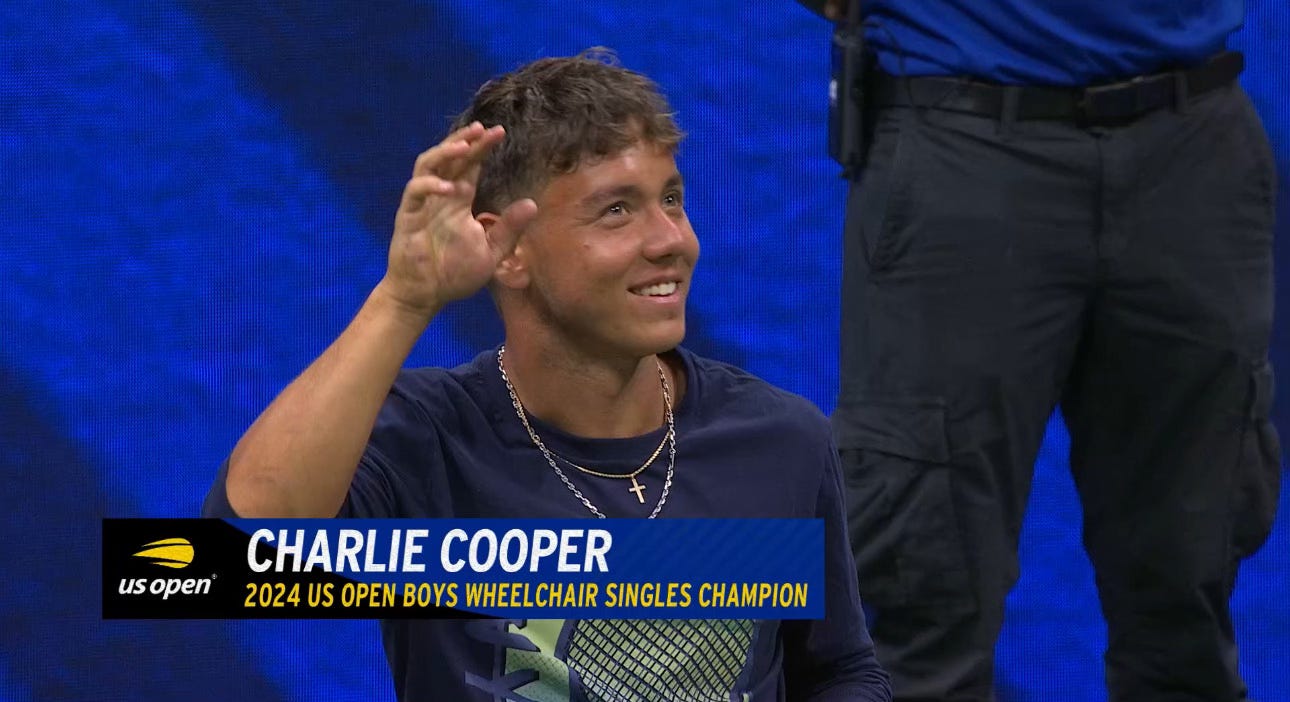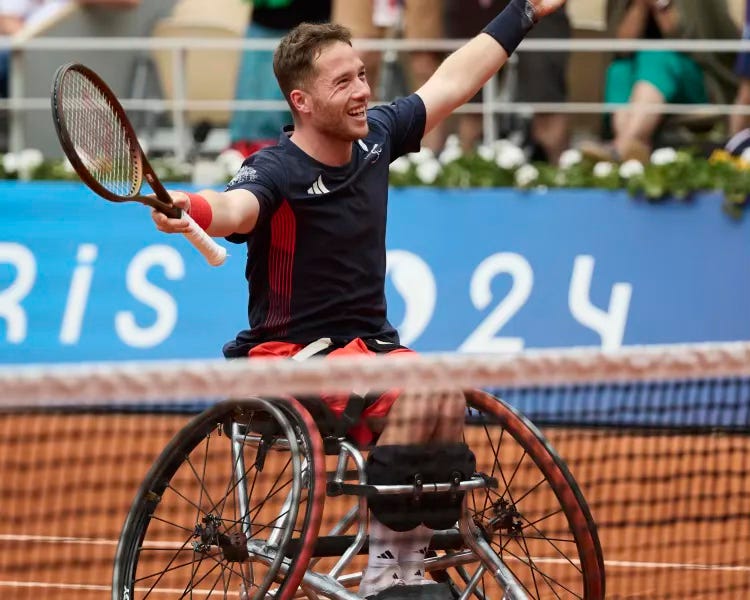When You Aren't Disabled Enough
Wheelchair Tennis Champion Alfie Hewett's Fight to Keep Playing Reveals Classification Issues in Para Sports

Wimbledon is well underway which is a great excuse to talk tennis. This week on the podcast, we sit down with wheelchair tennis boys champion Charlie Cooper. Charlie has his sights set on the LA28 Paralympics. We talk chairs, tactics, play styles, heroes, and everything you need to know to enjoy watching wheelchair tennis. Take a listen!
What Is Classification?
Players in wheelchair tennis are divided into two classes: open and quad. Quad players have disabilities in both their upper and lower bodies. Players in the open category, like Charlie Cooper, have disabilities that limit movement in their trunks or legs but no limitations in their upper limbs. Classification is a complicated business and can lead to some uncomfortable conversations. (Need a primer on classification? Take a listen here.)
Back in 2019, the International Tennis Federation issued new rules for classification. Before that, players decided for themselves and self-declared their disabilities. The new guidelines required all players in the open category be assessed by independent medical staff based on updated criteria to determine the players’ eligibility.
By 2019, British wheelchair tennis player Alfie Hewett had won multiple Grand Slam titles and the 2016 Paralympic silver medal in both men’s wheelchair singles and doubles. Still a teenager, Hewett had shot to the top of the sport. He headed into his reassessment like every other wheelchair player. But it did not go as anyone expected.
Disabled, But Not Disabled Enough
Hewett suffers from Perthes Disease, a degenerative disorder that causes damage to the hip joint and femur bone. Hewett is able to walk but cannot compete in standing sports. The independent assessor determined that Hewett did not meet the new standard for wheelchair tennis and would be barred from competition after 2020.
Hewett appealed the decision, saying that assessors used criteria that was too generic and not related to specific physical actions in tennis. The ITF resisted the appeal and Hewett faced the end of his tennis career. After winning the doubles title at the Australian Open with fellow Brit Gordon Reid in January 2020, Hewett said, “I shed a few tears at the end,” at the prospect of never playing at the Australian Open again.
Then covid-19 hit, ending the tennis season and postponing the 2020 Tokyo Paralympics.
On Second Thought
During the pause in competition, ITF reconsidered and accepted Hewett’s appeal. The federation revised its criteria to state that players are eligible to play wheelchair tennis as long as their disabilities render them unable to play standing tennis. Hewett was reexamined in 2021 and declared eligible to compete in the open wheelchair division.
Alfie Hewett made the most of his second chance. He now holds nine singles and 21 doubles Grand Slam titles and five Paralympic medals, including gold in men’s wheelchair doubles at Paris 2024.
Side note: I got to see Hewett play at Roland Garros and it was just as great as I hoped. Hear the story here.
Cheating Accusations Persist
Hewett’s story reveals an ugly truth in para sport: the classification system does not always work.
In 2020, the International Wheelchair Basketball Federation moved to update its criteria at the direction of the International Paralympic Committee. Under the new rules, several players in wheelchair basketball were declared ineligible only months prior to the Tokyo Paralympics, leaving teams like Canada and Great Britain scrambling with appeals and new line-ups.
Last summer, American para swimmers got caught up in a social media spat over whether multi-Paralympic medalist Christie Raleigh-Crossley had an unfair advantage because she was classed with swimmers with more visible disabilities than she has. We were not surprised since para swimmer Jessica Long spoke with us about her concerns with classification.
Between the Tokyo and Paris Paralympics, para track and field athlete Nick Mayhugh was reclassified from T37 to T38 (in other words, from a class with a greater level of disability to a class with fewer physical limitations) not because anything changed in his medical profile, but because his results were deemed too good. At Tokyo, Mayhugh won three golds and one silver. In Paris, Mayhugh finished no higher than 5th in any of his events.
On our next podcast episode focused on Sydney 2000, we will share the worst incident of “class doping” in Paralympic history: Spain won the gold medal in intellectually disabled basketball. Only problem? The players faked their disabilities.
So What Can Be Done?
Classification is not an exact science and even the science behind it is changing. The point is to provide an even playing field for athletes with similar levels of physical abilities but each class needs a large enough population of athletes to support healthy competition.
It can be confusing for fans as well. How can an announcer quickly and simply explain that a runner with two legs is competing fairly against a runner with a below-the-knee amputation? Or what invisible disabilities like cerebral palsy do to an athlete’s physical function?
IPC began a full review of its classification code in 2021 and issued a new code this year. The new rules seek to standardize classification criteria across sports with a focus on functional assessment, i.e. how one’s disability affects one’s ability to play a sport. We won’t see the full impact of the new rules until the Los Angeles 2028 Paralympics; the IPC determined that the new rules will not be implemented in winter sports until after Milan-Cortina 2026.
The new rules also include more precise guidelines for personnel conducting the classification assessments. When classification is based more on science and data and less on personal observation, classification decisions should be more consistent.
We cannot expect any system to be perfect. As with performance enhancing drugs, if athletes are willing to cheat the classification system, they will find a way to cheat. But good optics matter as do athletes’ faith in the system. We will keep an eye out as to whether the new IPC rules achieves either.
July is Disability Pride Month
So it is the perfect time to watch para sports! Want to learn more? Keep an eye for our podcast playlist on the Paralympics, coming later this week!





